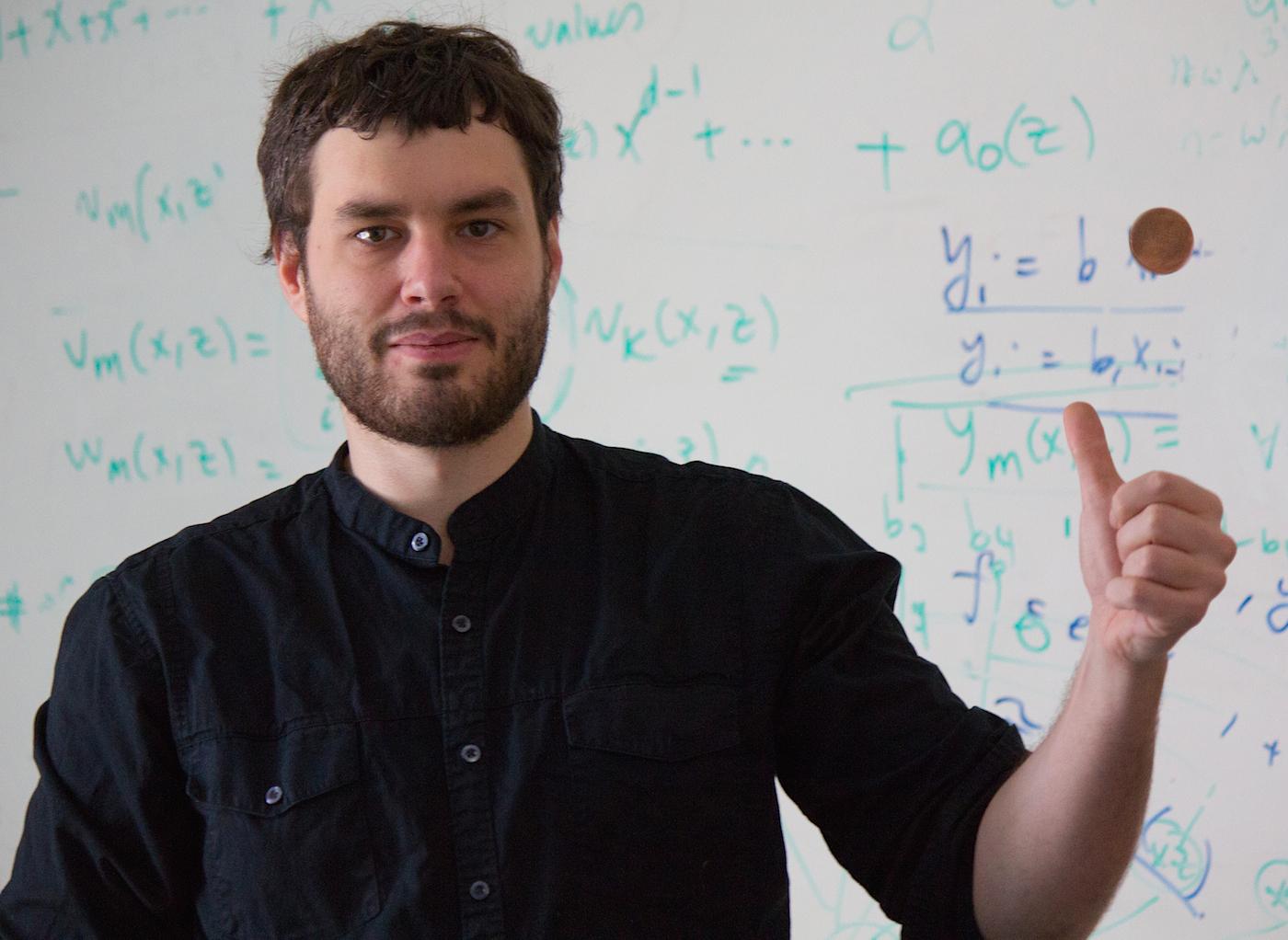
Andrew Miller’s love affair with Bitcoin began while poking around online. So it’s only fitting that he now shares his considerable knowledge of cryptocurrency, in part, through an online course.
The third-year computer science doctoral student in the Maryland Cybersecurity Center (MC2) co-teaches two courses that focus on Bitcoin: a massive online open course (MOOC) developed with faculty and postdocs at Princeton and Stanford; and a two-credit graduate seminar on various cryptocurrencies that meets weekly on the College Park campus.
“I'm hoping to spread some of my enthusiasm for this topic,” says Miller, who has closely followed the Bitcoin phenomenon since it first surfaced as open-source software in 2009.
Bitcoin uses peer-to-peer technology to operate with no central authority or banks. It can be used as payment for goods or services, and is being touted to mainstream merchants as an attractive alternative because its processing fees are lower than those used for credit cards.
“Participation is voluntary. There's no administrator, and empirically it’s been a huge success so far,” Miller says. “In general, when you try to get anonymous strangers on the Internet to play nicely together, you get a few bad apples that spoil everyone’s fun—even more so when there’s actual value at stake. So it’s surprising and inspiring that Bitcoin has succeeded at all, and we should learn all we can from it.”
The online MOOC that Miller co-teaches focuses on all aspects of Bitcoin, from what makes it unique to how it functions on a technical level.
The free class saw 1,000 registrations within 24 hours of being announced on Jan. 23. There are now more than 2,300 students enrolled in the MOOC, which began Feb. 16 and consists of 11 video lectures released at the rate of one per week.
Miller first learned about Bitcoin as a graduate student at University of Central Florida, where he studied computer graphics and augmented reality. While participating in online open-source projects, he began interacting with Bitcoin developers in a chat room. This led him to devour the then-sparse academic literature on digital currency, he says.
After transferring to the graduate program at Maryland in 2013—where he continued researching Bitcoin in earnest—Miller began communicating with Arvind Narayanan, an assistant professor of computer science at Princeton. Narayanan, a co-developer of the online MOOC, was searching for collaborators for a Bitcoin survey paper. Miller volunteered, and the resulting paper, “Research perspectives on Bitcoin and second-generation cryptocurrencies,” will be presented at the 2015 IEEE Symposium on Security and Privacy in May.
“Andrew is fast becoming known as an expert on Bitcoin, both within the academic community and the community of Bitcoin developers and aficionados,” says Jonathan Katz, director of MC2. “It is quite impressive for a graduate student to already have such stature in this area.”
Miller has written several other papers on Bitcoin and has also given talks on the topic, including at the 2014 IEEE Symposium on Security and Privacy last May. He presented a paper he co-authored with two MC2 faculty members that focused on repurposing Bitcoin for long-term data preservation.
Katz is one of Miller’s advisers in MC2, along with computer science and MC2 faculty members Michael Hicks and Elaine Shi.
Miller’s cryptocurrency work with Shi focuses on looking for new problems and applications, inventing solutions, analyzing them, and figuring out how to market their work to both the Bitcoin community and security research community.
“Elaine is a powerhouse—she works extremely hard, is fearless, and finds solutions when I get stuck,” Miller says. “I've also worked with [computer science professor] Bobby Bhattacharjee on measurement studies of the Bitcoin network. Cryptocurrency is a great topic to study from all these different angles.”
Miller’s research led to him co-teaching the UMD graduate seminar this semester with Shi. “Science of Cryptocurrency” gives an overview of various crytocurrencies, including Bitcoin, and then asks students to come up with ideas to make the alternative currencies more secure, while also increasing their usability.
“The class discussions and research projects have been extremely fascinating,” says Kevin Delmolino, a junior at Maryland with a double major in computer science and economics who received special permission to take the graduate-level class.
Students in the class are getting hands-on experience using Bitcoin, Delmolino says, and are also tasked with building secure “blockchains”—a distributed mechanism to keep track of every transaction of the currency.
“Given a few more years to build out a more robust and present payment network, [Bitcoin] could be an interesting competitor to standard money,” he says.
—Story by Melissa Brachfeld
The Maryland Cybersecurity Center is jointly supported by the College of Computer, Mathematical, and Natural Sciences and the A. James Clark School of Engineering. It is one of 16 centers and labs in the University of Maryland Institute for Advanced Computer Studies.